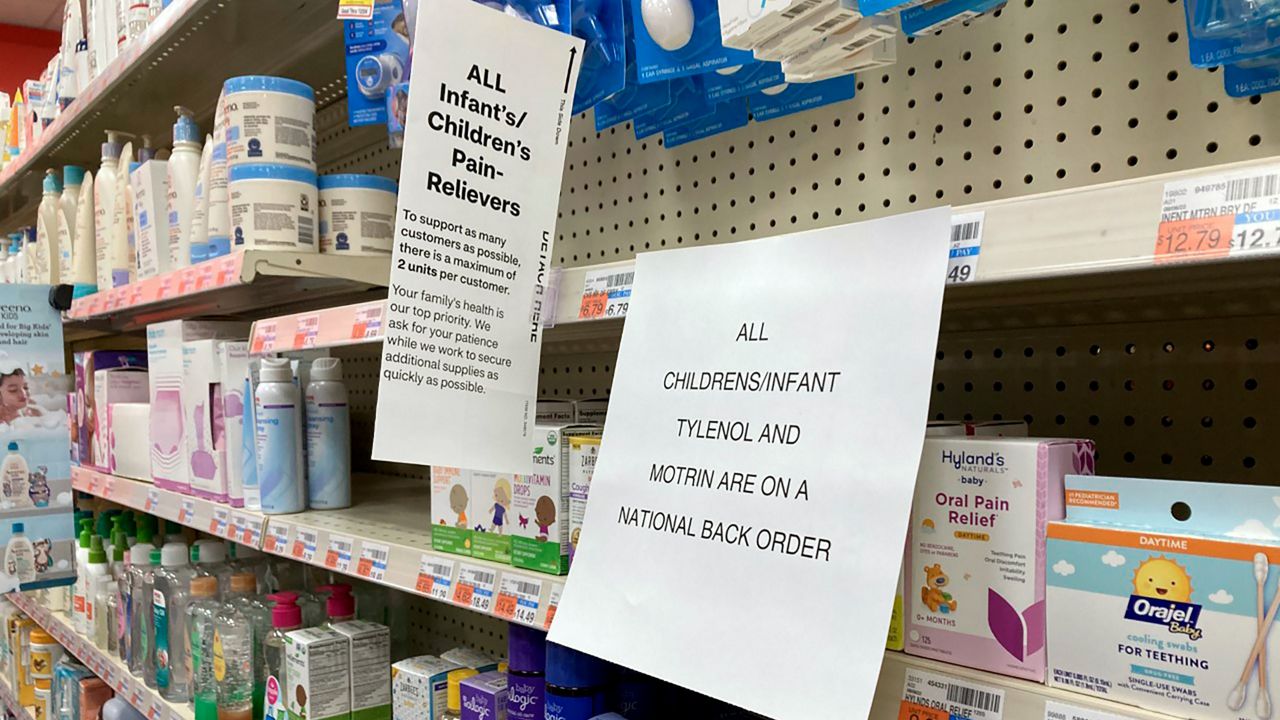CVS and Walgreens are limiting purchases of children’s pain relievers due to shortages of Children’s Tylenol and other medications amid a “tripledemic” of COVID-19, flu and RSV cases across the United States.
What You Need To Know
- CVS and Walgreens are limiting purchases of children’s pain relievers due to shortages of Children’s Tylenol and other medications amid a “tripledemic” of COVID-19, flu and RSV cases across the United States
- CVS has implemented a two-product limit on all children’s pain relief products purchased at its pharmacies or online
- Walgreens has set a six-item cap on over-the-counter fever relievers purchased online, but not in its stores
- Johnson & Johnson, the maker of Tylenol, said it is not experiencing widespread shortages of Children’s Tylenol, but the product may be “less readily available” at some stores
CVS has implemented a two-product limit on all children’s pain relief products purchased at its pharmacies or online.
Walgreens has set a six-item cap on over-the-counter fever relievers purchased online. It is not limiting in-store purchases.
In a statement sent to Spectrum News on Tuesday, CVS said the limit was set to “ensure equitable access for all our customers.”
“We’re committed to meeting our customers’ needs and are working with our suppliers to ensure continued access to these items,” the statement said.
Walgreens told Spectrum News that "Retailers nationwide are experiencing supplier fulfillment challenges due to increased demand of over-the-counter pediatric fever reducing products" and that the limit is to "prevent excess purchasing behavior."
Johnson & Johnson, the maker of Tylenol, said it is not experiencing widespread shortages of Children’s Tylenol, but acknowledged the product may be “less readily available” at some stores. The company said it is running its production lines around the clock.
The Consumer Healthcare Products Association said, too, there is not a widespread shortage of children’s pain relievers, but it noted that an early and severe flu season, combined with cases of COVID and RSV, have led to a 65% spike in the sale of such drugs compared to this time last year.
The group encouraged consumers to “buy only what they need, so other families can find and purchase the medicines they are seeking.”
Doctors and other experts say the problem could persist through the winter cold-and-flu season but should not last as long as other recent shortages of baby formula or prescription drugs.
Aside from over-the-counter products, the prescription antibiotic amoxicillin also is in short supply due to increased demand, according to the Food and Drug Administration. The drug is often used to treat nose and throat infections in children.
The Centers for Disease Control and Prevention said earlier this month it was seeing its highest level of flu hospitalizations in a decade. There have been 30 pediatric flu deaths this season.
RSV infections, meanwhile, have been significantly higher than in past years. Health officials say the spike is not surprising because some children who might have been infected by RSV a year or two ago if they had not been isolated during the pandemic are being exposed to the virus for the first time now, along with toddlers and infants.
Most kids are infected by RSV by age 2, according to the CDC. Most people recover in a week or two, but the virus can cause serious illness, especially in infants, other young children and older adults. According to the CDC, the virus kills 100 to 300 children ages 5 and younger and hospitalizes more than 58,000 kids in that age group each year.
RSV cases, however, are down more than 60% since early November, CDC data shows.
COVID-19 infections nationally fell last week to 455,466 — an average of 65,000 a day — but are still about 75% higher than in late October.
If caretakers are unable to find cold-and-flu medicine for their child, health experts recommend checking for generics or at other stores. The shortages may vary around the country or even within communities. Caretakers can also contact their doctor to ask about alternative treatments.
The Associated Press contributed to this report.



